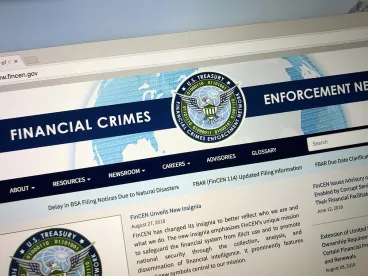On September 29, 2022, the United States Department of the Treasury’s Financial Crimes Enforcement Network (FinCEN) issued a final rule requiring millions of private companies to report their ownership to the United States government beginning January 1, 2024. Most privately held corporations, LLCs, limited partnerships and other entities created or doing business in the United States will be subject to the new rule unless an exemption applies.
As summarized in a previous alert, ownership reporting was mandated under the Corporate Transparency Act (CTA) enacted on January 1, 2021. The CTA was intended to make it more difficult for criminals, organized crime rings and other illicit actors to hide their identities and launder money through the U.S. financial system.
This new rule will increase the compliance burden on small businesses in the U.S. Despite the length of time since the CTA was enacted, many companies remain unaware of the additional steps they will have to take once the rule goes into effect in 2024.
Who has to report?
All privately held corporations, limited liability companies, limited partnerships, business trusts and similar entities organized in any state, as well as foreign companies registered to do business in the U.S., will be required to report ownership information to FinCEN unless an exemption applies.
The most significant exemption for privately held entities will likely be the exemption for companies with more than 20 full-time employees in the U.S., more than $5 million in gross receipts or sales inside the U.S., and an operating presence at a physical office in the U.S.
The following entities are also exempt from reporting:
-
Governmental entities and public utilities;
-
Banks, bank holding companies, and credit unions;
-
Broker-dealers and registered investment advisors;
-
Registered investment companies and certain pooled investment vehicles;
-
Insurance companies;
-
Registered public accounting firms;
-
501(c) non-profit entities;
-
Public companies, i.e., companies that have issued a class of securities registered under Section 12 of the Securities Exchange Act of 1934 or that are required to file reports under Section 15(d) of that act; and
-
Entities owned or controlled by one or more exempt entities.
What information must be reported about owners?
All companies that do not meet one of the exemptions must identify each owner by giving the owner’s full legal name, date of birth, current residential or business street address, and a unique identifying number from a non-expired identification document. Acceptable identification documents include U.S. passports, state-issued driver’s licenses, and state identification cards. If the beneficial owner does not hold any U.S.-issued identification documents, a foreign passport number is sufficient.
Alternatively, owners may apply to FinCEN to be issued a FinCEN identifying number that can be reported instead of having to report all of the information above each time.
What other information must be reported?
In addition to the information about owners, reporting entities will have to report the following:
-
The full legal name of the entity;
-
Any trade name or “doing business as” name of the entity;
-
The entity’s principal place of business address;
-
The entity’s state, tribal, or foreign jurisdiction of formation (and, in the case of a foreign entity subject to CTA reporting, the U.S. state or tribal jurisdiction in which the foreign company first registered); and
-
The taxpayer identification number under which the entity reports to the Internal Revenue Service. Foreign reporting companies without a TIN will be required to provide a foreign tax identification number.
In addition to the above, reporting companies created after January 1, 2024, must also provide information regarding every individual who files the document to create or register the reporting entity, including any individual primarily responsible for directing or controlling such filing if more than one individual is involved in the filing. The new rule refers to such a person as a “company applicant.”
Who is considered an owner?
The CTA applies a “beneficial” ownership definition, which includes all individuals who directly or indirectly (i) exercise substantial control over the reporting entity, or (ii) own 25% or more of the ownership interests of the reporting entity. The term does not include a minor child; a person acting as a nominee, intermediary, custodian, or agent on behalf or another person; a person who derives control of an entity solely from their employment status; a person whose only interest in an entity is through a right of inheritance; or a creditor of an entity not otherwise controlling the entity.
What is “substantial control”?
As used to determine the beneficial owners of the entity that must be reported, the final rule defines “substantial control” to include:
-
Service as a senior officer of the reporting entity;
-
Authority over the appointment or removal of any senior officer or a majority of the members of the board of directors (or similar body);
-
Direction, determination or substantial influence over important decisions made by the reporting entity; and
-
Any other form of substantial control over the reporting entity.
The final rule further clarifies the circumstances in which an individual’s authority will be viewed as sufficiently substantial as to require reporting information regarding that individual. Regardless of office or title, substantial control over a reporting entity includes the ability to direct, determine or exercise substantial influence over important decisions made by the reporting entity. Such decisions include:
-
The nature, scope, or attributes of the business conducted by the reporting entity, including the mortgage, lease, sale, or other transfer of its principal assets, reorganization, dissolution, or merger of the reporting entity;
-
Major expenditures or incurring significant debt;
-
Issuance of any equity interests by the reporting entity;
-
Approval of the operating budget of the reporting entity;
-
Selection or termination of business lines or geographic areas in which the reporting entity does business;
-
Approval of the operating budget of the reporting entity;
-
Selection or termination of business lines or geographic areas in which the reporting entity does business;
-
Approval of compensation schemes;
-
Adoption of incentive programs for senior officers;
-
Approval, performance, or termination of important contracts;
-
Amendment of any substantial governance documents of the reporting entity, including the articles of incorporation and other formation documents;
-
Amendment of important policies or procedures of the reporting entity; or
-
Exercise of any other form of substantial control over the reporting entity.
The means through which substantial control is exercised by an individual is irrelevant and such control may be direct or indirect, formal or informal. An individual may be deemed to have substantial control if the ability to exercise substantial control exists, even if control is never actually exercised.
What is an ownership interest?
The final rule broadly defines “ownership interest” to include any type of equity interest, whether it be financial, voting or non-voting.
In the case of non-corporate reporting entities, any interest in capital or profits qualifies as an ownership interest, including limited and general partnership interests.
Convertible debt, warrants, rights to purchase or subscribe to equity interests, and any put, call, straddle, or other option or privilege of buying or selling an ownership interest also constitute ownership interests. The final rule includes a catch-all provision of “[a]ny other instrument, contract, arrangement, understanding, relationship, or other mechanism used to establish ownership” as well.
Where will the reported information be stored?
FinCEN will develop an information technology system that will store reported information in accordance with the security and confidentiality requirements of the CTA.
When is the rule effective and what’s next?
The rule is effective January 1, 2024. Reporting companies created or registered before January 1, 2024, will have one year to file their initial reports. Reporting companies created or registered after January 1, 2024, will have 30 days after creation or registration to file their initial reports.
Once an initial report has been filed, entities will have to file updates to the report within 30 days of any change in their beneficial ownership information.
This reporting rule is one of three rulemakings planned to implement the CTA. FinCEN will implement additional rules to (1) establish who may access beneficial ownership interest, for what purposes, and what safeguards will be required to ensure that the information is secured and protected; and (2) revise FinCEN’s customer due diligence rule.




 />i
/>i

